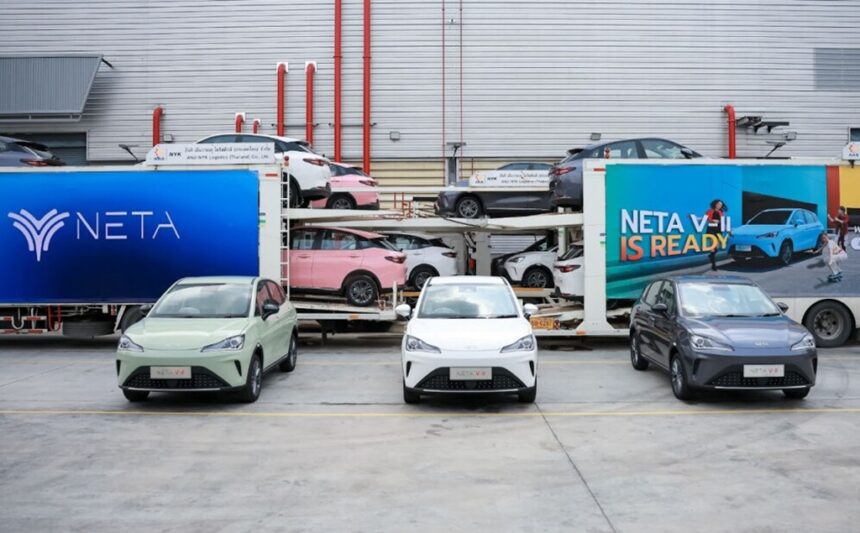BANGKOK – The Thailand Consumers Council (TCC) has revealed plans to launch a class action suit against NETA Auto (Thailand) Co., Ltd., the exclusive distributor of NETA electric vehicles from China.
This move follows a surge in complaints about delayed repairs, poor after-sales service, and broken commitments. The announcement, made on 7 July 2025, comes as NETA faces doubts about its financial health and its parent company’s bankruptcy in China.
These concerns have put pressure on Thailand’s push to grow its electric vehicle sector.
Customers across Thailand have shared their frustration with NETA, many speaking out online about long wait times for repairs due to missing spare parts, with some waiting as long as ten months. Others have been left with unregistered vehicles and no legal number plates, while support after purchase is lacking.
Dealers echo these concerns, saying the situation has made it hard to sell vehicles and has damaged trust. “Selling cars is difficult right now. There’s no confidence,” explained Chatdanai Komrutai, a local NETA dealer.
The TCC’s court action seeks to make NETA answer for these problems and clarify who is responsible for customer protection.
Eighteen NETA dealers have also filed a complaint with the Excise Department to claim more than 200 million baht (over $6 million) owed for showroom costs and aftercare support.
Dealer Saravut Khunpitiluck, who has begun legal proceedings, said, “I stopped ordering more cars in September because I sensed something was wrong.”
NETA’s Parent Company’s Bankruptcy Adds Pressure
NETA’s troubles are linked to its parent company, Zhejiang Hozon New Energy Automobile, which began bankruptcy proceedings in June 2025 after a creditor demanded payment of 5.3 million yuan ($730,000). Reports say Hozon’s total debt is more than 10 billion yuan ($1.4 billion), with losses of over 100 billion yuan (about 400 billion baht).
This crisis has led to the closure of showrooms in China, missed wage payments, and activity stopping in Malaysia and Singapore, leaving Thailand as NETA’s main overseas market.
NETA Auto Thailand has denied any bankruptcy, saying Hozon is in a government-backed restructuring to find new investors and convert debt into equity. But a Thai supplier disputes this, claiming NETA’s local staff were let go by May 2025, leaving many dealers and suppliers with big losses.
The recent sale of NETA V-II cars for 299,000 baht ($9,135) without warranty has only hurt customer confidence further. Only 1,067 units sold in the first four months of 2025, a drop of 37.3% from the same period last year.
Thailand’s EV Market Faces Price Cuts and Uncertainty
Thailand’s electric vehicle market saw strong growth early in 2025, with registrations up 22.35% to more than 31,000 units. Yet competition from Chinese brands has become intense, with 18 now active in the country, twice as many as last year.
Some brands have cut prices by over 20%. NETA’s V-II Lite, priced at 549,000 baht ($16,924), faces tough competition from BYD’s Dolphin at 569,900 baht. While lower prices aim to boost sales in a weak economy, they have reduced profit margins for smaller firms like NETA, deepening their financial troubles.
The price war has raised worries about too many vehicles on the market and whether this growth can last. According to Abhik Mukherjee from Counterpoint Research, “Neta’s downturn in Thailand reflects the fragility of second-tier Chinese EV brands.”
The country’s plan to shift 30% of its $53 billion auto industry to electric cars by 2030 is now under threat, as smaller brands struggle with price pressure and government rules requiring local production to match imports.
Shoppers Choose Trusted Toyota and Honda Hybrids
As faith in Chinese electric cars drops, more Thai buyers are turning to hybrid vehicles from Japanese brands like Toyota and Honda. These companies have built a strong reputation for reliability, fuel efficiency, and easy maintenance. Their widespread service networks also give buyers peace of mind, especially as many face household debt and stricter lending rules.
Toyota and Honda now offer popular hybrid models such as the Toyota Corolla Cross and Honda CR-V Hybrid, HEV, combining electric motors with petrol engines for better fuel economy and lower running costs compared to full EVs.
One happy owner shared on social media, “I have a Toyota and in five years of ownership, not a single problem.” This trust in Japanese brands remains strong.
Industry figures show a shift away from Chinese EVs, with NETA’s share of the Thai market dropping from 12% in 2023 to just 4% at the start of 2025. Rising EV maintenance costs, including expensive battery replacements, have only added to these concerns.














